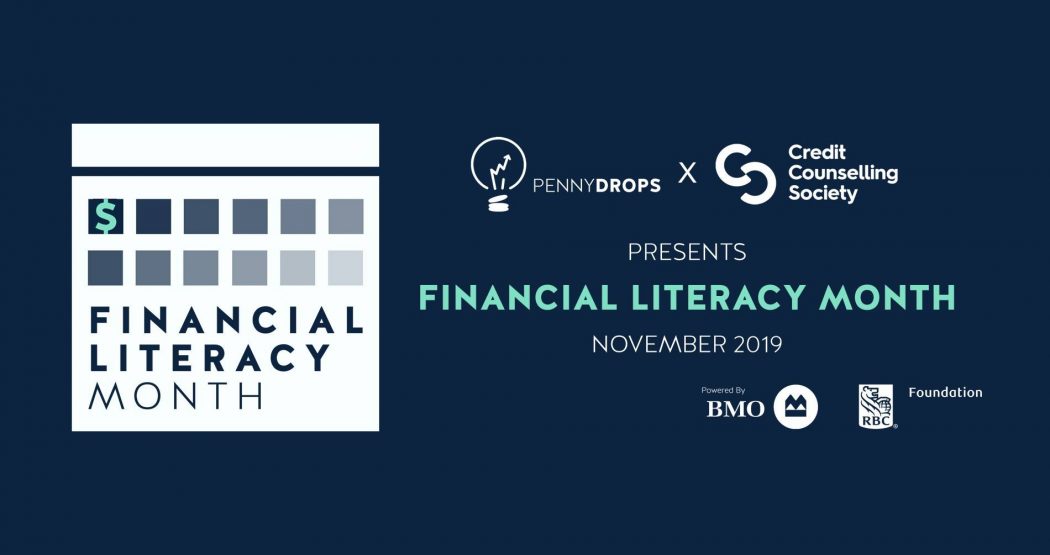When looking at any education system, one of the most important aspects of teaching is ensuring the student understands the language they are being taught in. For this reason, reading, writing, listening and speaking skills are all emphasized heavily at the elementary levels of education. This ensures that even when learning material becomes more extensive and enriched, students will at least be able to understand what they are looking at. This understanding of language is more commonly known as literacy.
Now we all know the importance of literacy. Without it, information and knowledge become useless because there is no conduit to understand it. However, when Google tells you that November is Financial Literacy Month, you may ask the questions, what is financial literacy? And, more importantly, why should you care?
“Only 36% of Canadians actually understood that applying for a credit card negatively affects credit score. Going even further, 50% of Canadians have no budget to define their financial plans, both short-term and long-term.”
Well, financial literacy is an extremely important and valuable skill to have. It is the understanding of money, how money affects people, and how people’s behaviours can affect their money. This includes concepts like smart banking, budgeting, investing, and saving for retirement. In totality, financial literacy is knowing what to do with your money and making smart financial decisions based on this knowledge.
While words like banking and budgeting are familiar to everyone, the truth is that people only have a surface understanding of what these different concepts are. Based on a survey conducted by Lowestrates.ca and IPSOS, only 36% of Canadians actually understood that applying for a credit card negatively affects credit score. Going even further, 50% of Canadians have no budget to define their financial plans, both short-term and long-term.
“It is the understanding of money, how money affects people, and how people’s behaviours can affect their money. This includes concepts like smart banking, budgeting, investing, and saving for retirement.”
Financial literacy rates are even poorer amongst the younger generations as of late, and if this continues, a large percentage of the population may end up in financial trouble straight out of post-secondary education. In a world where exorbitant spending and astronomically large sums of money are becoming more common, this is a major problem.
However, it’s never too late, and this is where PennyDrops McGill comes in. PennyDrops is a student-run non-profit charity, powered by BMO, whose mission is to ensure that all Canadian students have sufficient financial education to make informed decisions during their postsecondary education, and afterwards as well. Through the help of PennyDrops mentors, the goal is to leave a lasting impact on the financial literacy of students, and helping them make use of it. As of now, they have over 20 chapters across Canada, and have made significant strides in improving financial literacy amongst high-schoolers.
“In commemoration of Financial Literacy Month this year, PennyDrops chapters will be holding 12 financial literacy workshops throughout the month on the campuses of McGill University, Ryerson, Queen’s, and Western.”
To further expand into Canadian universities, PennyDrops is partnering with the Credit Counseling Society (CCS). The CCS will be responsible for providing PennyDrops mentors with professional training as well as the curriculum, and PennyDrops will spread the word on campus about the workshops that they are holding. In commemoration of Financial Literacy Month this year, PennyDrops chapters will be holding 12 financial literacy workshops throughout the month on the campuses of McGill University, Ryerson, Queen’s, and Western. All of which are open to the entire student body to participate.
The workshops and services they provide to students are not just meant to help them budget, but to help improve their overall financial literacy and increase awareness on the realities of money. This is what differentiates PennyDrops from being a simple financial advisor, and this is why the work that they are doing is so important to students both now and in the future.
Like regular literacy, financial literacy is something that can most certainly be taught and nurtured in the population, and with the help of organizations like PennyDrops, the financial outlook for future generations is looking much brighter.








